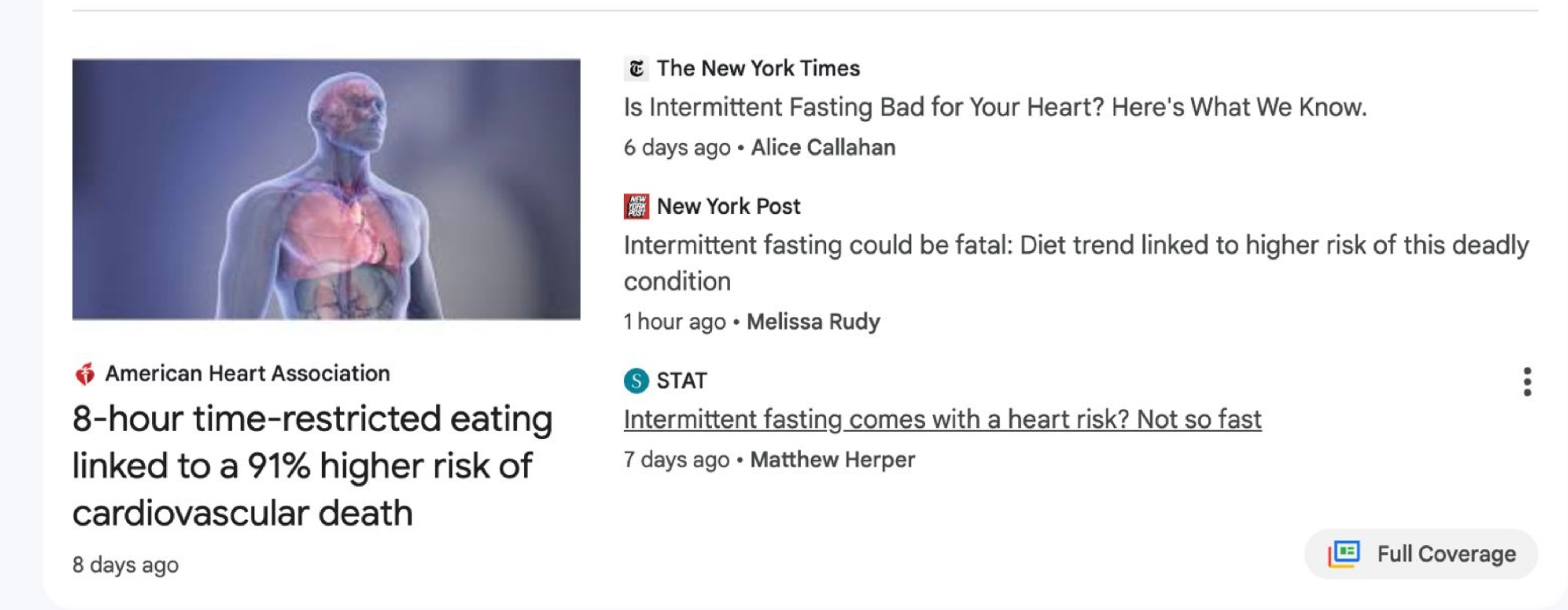
Let’s start with the fiction shown here below:
American Heart Association:
8-hour time-restricted eating linked to a 91% higher risk of cardiovascular death
The New York Times
Is Intermittent Fasting Bad for Your Heart? Here's What We Know.
6 days ago • Alice Callahan
A New York Post
Intermittent fasting could be fatal: Diet trend linked to higher risk of this deadly condition
1 hour ago • Melissa Rudy
O STAT
Intermittent fasting comes with a heart risk? Not so fast 7 days ago • Matthew Herper
Here are the Facts:
Medications for heart disease act ONLY as a Band-Aid effect, temporarily managing symptoms and mitigating risk factors without addressing the underlying causes of the illness and they do not actively reverse the progression of heart disease or address the root causes such as poor diet, sedentary lifestyle, and chronic stress. This means nothing changes except to potentially worsen.
The heart is not suffering from a depletion of heart medication. That would be a silly notion.
The approach to reversing heart disease requires comprehensive lifestyle changes, including a heart-healthy diet, regular exercise, stress management techniques, and smoking cessation.
By focusing solely on medications, we may overlook the opportunity to address the fundamental drivers of heart disease and miss out on the transformative potential of lifestyle interventions in achieving long-term cardiovascular health.
It's within our grasp to recognize that the pharmaceutical industry may not be inclined to endorse comprehensive education on permanent solutions through wellness, as this could potentially diminish their customer base.
Currently there is a campaign circulating that aims its attack the actual benefits of FASTING, and being one of the components in the APEX31 mindset we feel it requires attention to bring forth fact base education versus the newly minted FICTION being spewed in this time of health awareness.
In response to this, here are the proven wellness benefits of fasting in a 16-18 hour window:
Improved Insulin Sensitivity:
Fasting helps regulate insulin levels, leading to increased sensitivity and better blood sugar control. Without sensitivity, the path you’d be on will eventually lead to fat storage and potentially diabetes and even hypertension. (high blood pressure)
Weight Management:
Fasting can aid in weight loss by promoting fat burning when reducing the insulin hormone during the fasting window promoting insulin sensitivity while giving the digestive system a daily break. Examine the modern lifestyle and you’ll see that the body is rarely, if ever giving the digestive system more than 12 hours of no food or sugary drinks
Enhanced Cellular Repair:
During fasting, cells initiate autophagy, a process that removes damaged components, dysfunctional proteins, and organelles, potentially reducing the risk of neurodegenerative diseases promoting cellular regeneration. CLEAN HOUSE and leaving only the healthiest and strongest cells, while reusing the energy from dead and damaged cells to fuel regeneration.
Enhanced Autophagy:
AUTOPHAGY alone should explain how the body is a Miraculous creation and by flexing your fasting muscles, you are naturally triggering this healing mechanism.
Increased Human Growth Hormone (HGH) Production:
Fasting can stimulate the production of HGH, which is essential for metabolism, muscle growth, and overall health. Made within the body and the path to age reversal and youthfulness.
Reduced Inflammation:
Fasting has been shown to decrease inflammation markers in the body, which may lower the risk of chronic diseases. The path to any sort of wellness or positive results in your health STARTS with addressing chronic inflammation.
Improved Brain Function:
Some studies suggest that fasting may enhance cognitive function, memory, and focus by promoting the production of brain-derived neurotrophic factor (BDNF). The connection is the Gut/Brain relationship. A healthy, rested gut microbiome (includes a fasting regimen) means positive mental rewards.
Longevity:
Some research indicates that fasting may promote longevity by increasing cellular repair mechanisms and reducing the risk of age-related diseases. AUTOPHAGY !
Improved Metabolic Health:
Fasting can lead to metabolic adaptations, such as increased fat oxidation and improved mitochondrial function, which support overall metabolic health. For example, Hypothyroidism is a function of liver affecting thyroid affecting lowered metabolic rate.
Regulated Appetite:
Fasting may help regulate appetite hormones, Ghrelin and Leptin. These are two of many hormones that control your appetite and fullness. They're involved in the vast network of pathways that regulate your body weight. Leptin decreases your appetite, while Ghrelin increases it. Ghrelin is made in your stomach and signals your brain when you're hungry or thinking of food. Fasting manages these hormones leading to better hunger control and reduced cravings.
Better Gut Health:
Fasting can promote gut health by allowing the digestive system to rest and eventually promoting a healthier gut microbiome. 90% of all illness stems from an unhealthy microbiome.
Enhanced Immune Function:
Fasting may strengthen the immune system by reducing inflammation and promoting the regeneration of immune cells. When energy is not wasted on chronic inflammation the body can focus on healing. Continuing down the same premise of AUTOPHAGY, flushing and cleaning house then leaving behind the healthiest, strongest cells.
Mood Regulation:
Some individuals report improved mood and mental well-being during fasting, possibly due to changes in brain chemistry and increased focus. More Gut/Brain conversation.
Convenience and Simplicity:
Fasting can simplify meal planning and save time, as there are fewer meals to prepare and consume within a shorter eating window.
Heart Health:
Fasting may improve heart health by lowering blood pressure, reducing cholesterol levels, and decreasing the risk of heart disease.
Let’s focus on Fasting and its contribution to the prevention of heart attacks and heart disease:
Reduced Inflammation:
Chronic inflammation plays a crucial role in the development and progression of heart disease. Fasting has been shown to decrease levels of inflammatory markers in the body, such as C-reactive protein (CRP) and interleukin-6 (IL-6), thereby reducing the overall inflammatory burden on the cardiovascular system. By way of inflammation being managed, it is contributing to cholesterol and triglycerides also being well managed.
Improved Lipid Profile:
Fasting has been shown to reduce levels of LDL cholesterol (often referred to as "bad" cholesterol) and triglycerides while increasing levels of HDL cholesterol (often referred to as "good" cholesterol). This favorable lipid profile can lower the risk of plaque buildup in the arteries, reducing the likelihood of heart attacks and strokes when combined with a high triglyceride count.
Lower Blood Pressure:
Fasting has been associated with reductions in blood pressure, both systolic and diastolic. High blood pressure is a significant risk factor for heart disease, and fasting-induced reductions in blood pressure can help lower the risk of cardiovascular events.
Enhanced Heart Rate Variability (HRV):
Fasting has been associated with improvements in heart rate variability, which is a measure of the variation in time intervals between heartbeats. Higher HRV is indicative of a healthier cardiovascular system and is associated with a reduced risk of cardiac events.
Improved Blood Sugar Control: Fasting can help regulate blood sugar levels and improve insulin sensitivity. High blood sugar levels and insulin resistance are risk factors for heart disease, and fasting-induced improvements in glucose metabolism can mitigate these risks.
Reduced Oxidative Stress:
Fasting may decrease oxidative stress in the body, which occurs when there is an imbalance between free radicals and antioxidants. Oxidative stress can damage cells, including those in the cardiovascular system, and contribute to the development of heart disease. By reducing oxidative stress, fasting may help protect against heart attacks and other cardiovascular events.
Weight Management:
Plays a big role in excess weight and obesity management. These are significant risk factors for heart disease. Fasting can aid in weight loss and weight management by promoting fat burning and reducing calorie intake. Maintaining a healthy weight through fasting can help reduce strain on the heart and lower the risk of heart attacks.
Overall, the combination of improved lipid profile, blood pressure regulation, reduced inflammation, enhanced HRV, better blood sugar control, decreased oxidative stress, and weight management can significantly contribute to the prevention of heart attacks and heart disease in individuals who practice fasting as part of a healthy lifestyle.
Falling for the lies is to be uneducated. APEX31 is here to counter that.

